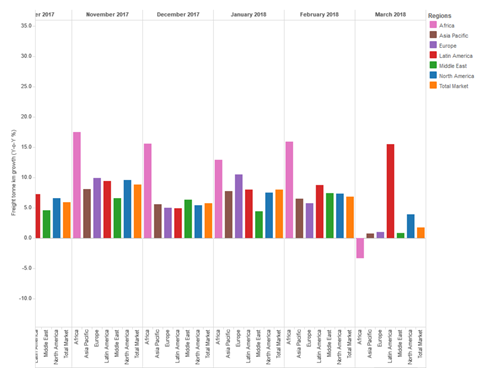Air cargo growth slipped to its lowest level in 22 months in March, with IATA citing the end of an inventory re-stocking cycle as the main reason for the slowdown.
The latest figures from IATA show that air cargo traffic in freight tonne km (FTK) terms increased by 1.7% in March, while capacity increased by 4.4% - marking the first time in 20 months that supply grew ahead of demand.
The total cargo load factor for the month stood at 46.4% compared with 47.6% a year earlier.
Cargo traffic growth over the first three months stood at 5.4% and IATA is predicting an increase of between 4-5% for the full year.
IATA said the sharp growth slowdown is principally due to the end of the restocking cycle, during which businesses rapidly increased their inventory to meet unexpectedly high demand, while a softening of global trade is also evident.
Analyst WorldACD said that the slowdown in growth also reflected a slow pick up after the Chinese New Year holiday. Weather conditions in Europe and North America were also tough during the month.
According to WorldACD, cargo volumes increased by 4.8% during the first quarter, while there was a growth of 0.9% in March.
IATA director general and chief executive Alexandre de Juniac said: "It’s normal that growth slows at the end of a restocking cycle. That clearly has happened.
“Looking ahead we remain optimistic that air cargo demand will grow by 4-5% this year. But there are obviously some headwinds.
“Oil prices have risen strongly, and economic growth is patchy. The biggest damage could be political. The implementation of protectionist measures would be an own-goal for all involved—especially the US and China."
Looking at regional performance, Asia-Pacific carriers reported March FTK growth of 0.7% compared to the same period a year ago.
“Export orders in Japan and Korea have fallen in recent months and the region remains particularly exposed to the impact of protectionist measures,” IATA said.
European airlines' FTKs rose 1% year on year in March due partially to a stronger euro and a softening of export orders in Germany, IATA said.
North American carriers’ freight volumes expanded 3.9% compared to March 2017.
“The US inventory-to-sales ratio has risen in 2018, indicating the boost to cargo growth from restocking is over,” explained the association.
Middle East carriers saw growth of 0.8% in March on a year earlier. This is consistent with the general weakening in regional performance over recent months, and in particular may reflect an especially strong March 2017 result.
Latin American was the best performing region with airlines posting growth of 15.5% in March compared with a year ago.
Freight volumes in the region have been recovering over the past 18 months, in part due to the better performance of the Brazilian economy.
Finally, African carriers saw cargo traffic fall by 3.4% in March.
“This result may, however, be influenced by the comparison with unusually strong growth in March 2017,” IATA explained.
“Indeed, Africa has reported the fastest growth of all regions for 17 of the last 18 months, so it would be premature to suggest this is the start of a negative trend.”
Click on chart for interactive version

Read more air cargo data news










